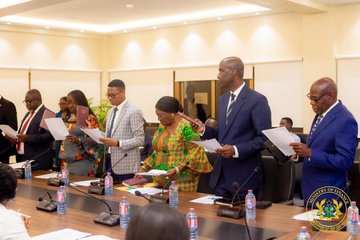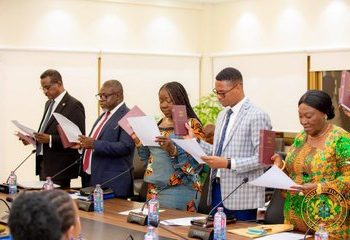New GRA Board Inaugurated, Charged to Drive Revenue Growth Amid Fiscal Constraints
- More Than Numbers: GRA Board Urged to Win Back Public Trust and Boost Revenues
In a bid to fortify Ghana’s domestic revenue base and shore up public finances, the newly constituted Governing Board of the Ghana Revenue Authority (GRA) has been inaugurated, with Finance Minister Dr Cassiel Ato Forson charging members to deliver tangible results in an era of constrained external financing and tightening budgetary conditions.
Speaking at the ceremony in Accra, Dr. Forson emphasised the gravity of the assignment before the Board, noting that the government’s ability to meet its fiscal consolidation targets hinges on reversing persistent revenue shortfalls and deepening administrative reforms within the Authority.
“This is a defining moment,” Dr Forson stated. “You assume this mantle at a time when the government faces significant fiscal constraints, with tight financing conditions, limited access to the capital market following the debt restructuring programme, and dwindling grants from development partners.”
Strategic Response to Shrinking External Support
Ghana’s budgetary prospects have become increasingly vulnerable following recent aid withdrawals, including over $234 million in USAID support previously allocated to health, education, and economic development programs. These cuts, Dr Forson argued, reinforce the urgent imperative to create a resilient, autonomous revenue system capable of meeting national development goals.
Against this backdrop, the government has committed to increasing revenue by 0.6 percentage points of GDP annually, aiming to achieve a primary fiscal surplus of 1.5% of GDP by 2025 and reduce the external debt service-to-revenue ratio to 18% by 2028, down from 28% in 2022.
The Minister’s comments reflect mounting pressure on the GRA to deliver not just incremental revenue gains but deep institutional reform to improve compliance, close loopholes, and rebuild public trust.
Priorities for the New Board
In outlining his expectations, Dr. Forson called for the comprehensive modernisation of GRA operations, improved internal controls, and a crackdown on smuggling and tax evasion.
Among the measures tabled was a mandatory rotation policy for GRA officers every two years, a structural change aimed at reducing the risk of collusion and enhancing accountability. The Minister also disclosed that a performance-based Memorandum of Understanding will be signed with the Commissioner-General and key revenue heads, linking bonuses to measurable outcomes.
“Revenue lost through corruption translates to unbuilt schools, unpaved roads, and lives adversely affected by inadequate healthcare and poor sanitation,” Dr Forson warned, urging the new Board to lead with integrity and competence.
The Minister also stressed the importance of institutional collaboration, particularly with the Ministry’s Revenue Policy Division, to align enforcement and policy design in a more agile and coherent framework.
Institutional Mandate and Political Support
The reconstituted GRA Board, whose members were appointed by President John Dramani Mahama, features a mix of private sector professionals, technocrats, and civil service experts. The composition is expected to bring renewed rigour to the GRA’s oversight, strategic direction, and public-facing accountability.
Dr Forson pledged his Ministry’s full support to the Board, describing their mandate as pivotal to “building the prosperous, inclusive, and self-reliant Ghana We All Want Together.”
The Road Ahead
With Ghana navigating a delicate post-restructuring fiscal landscape, the GRA Board’s performance over the next 12 to 24 months will be watched closely by investors, development partners, and the general public.
The Authority’s ability to meet its targets without overburdening an already taxed population will test the government’s fiscal creativity, operational discipline, and institutional resolve.










